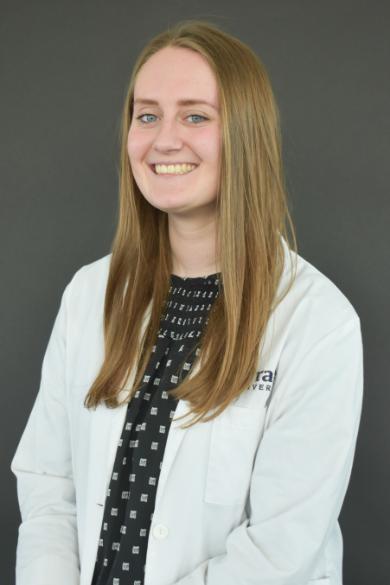Pharmacy Spotlight
Meet Jessica Berei, a P4 student in Drake's Doctor of Pharmacy (PharmD) program. This year, Jessica completed a clinical rotation at the Iowa Poison Control Center in Sioux City, Iowa.
 Name: Jessica Berei
Name: Jessica Berei Tell us about your rotation site at the Iowa Poison Control Center. What was your primary role?
The Iowa Poison Control Center provides free 24-hour treatment advice for poison emergencies. The IPCC helps with questions about household products, drugs (prescription, over the counter, herbal. Illegal, and animal medicines), chemicals, and animal bites. Calls are answered by highly trained registered nurses and pharmacists who are certified in poison information.
Every day I spent time reviewing real patient cases called into the poison center and managed by CSPIs (Certified Specialists in Poison Information). These cases include both patients calling on their own behalf and calls from healthcare providers throughout the state of Iowa. After working up these cases, I would present them to the center’s medical director (physician certified in medical toxicology) for discussion on appropriate treatment guideline protocols and follow up monitoring. As the rotation continued, I provided my own recommendations and follow-up monitoring. Initially the role of the student is to familiarize yourself with the world of toxicology. Later on you spend more time independently assessing cases and making recommendations (just like you would do in the real world)!
How did Drake prepare you for your experience at the Iowa Poison Control Center?
Drake gave me the basic knowledge and skills to succeed, but I was able to further refine them on site. While Drake gave me a basic understanding of toxicology, there were many things I didn’t know coming in. I think this was the cool part about this rotation though – you learn things they don’t teach in the classroom. Whether you want to work in a community pharmacy, hospital, etc – the information you learn on this rotation is something you will carry with you throughout your career.
What was your biggest lesson from this rotation experience?
I think we generally think of medication in terms of the good it can do for a patient – however, I think we sometimes forget the damage it can cause as well. We spend so much time dosing medication to make sure it is in the proper therapeutic range, but for almost all medications there are bad consequences of exceeding these recommended doses. This rotation taught me the importance of making sure patients are receiving appropriate medications and that monitoring parameters are in place to prevent toxic situations.
What is your favorite memory from this experience?
I can’t say there was one in particular. This was one of my favorite rotations and one that I was excited for every day. The staff are amazing and so kind – it was so easy to become a part of the IPCC family. It was nice to see the staff loved having pharmacy students there as much as I loved being there.
Contrary to what you would think of for a poison control center, it was a light hearted environment. It was very apparent that everyone loved working there.
Share a few things you've liked the most about your time at Drake as a pharmacy major.
Over the years I’ve grown to really appreciate Drake’s sense of community. In the pharmacy program especially, faculty and staff want to see you succeed and will do all they can to help you meet your goals. I’m thankful to have attended a college where professors were so accessible and genuinely cared about my growth and development. There are also so many means to get involved. Whether you are looking to do research or partake in an organization, there is so much Drake has to offer. Additionally, I liked being challenged. Whether it was lab practical’s, tests, or rotations – the experiences I have had pushed me to be a better pharmacist. Finally, I’ve really enjoyed connecting the dots between disease states and medications. You spend a large amount of time understanding common disease states and later on learn about the medications used to treat/prevent these disease states. It has been really cool to understand how medications mechanisms fit into these diseases.
What are some of your accomplishments at Drake in the pharmacy program?
Obtaining numerous organization leadership roles (NCPA President, ASHP Philanthropy director), participating in the CPHS Student Leadership Development Series, taking part in Drake’s dual degree program (PharmD/MBA), graduating Cum Laude, and matching with a residency program I love!
What is one piece of advice you have for future Drake pharmacy students?
During your time at Drake, do more than memorize the information presented to you. While there will always be a place for memorization, in clinical practice you need to be able to apply this information. Therefore during school, I think it’s crucial you understand concepts rather than just memorize them. It will make rotations easier and will make you a much more competent practitioner!



